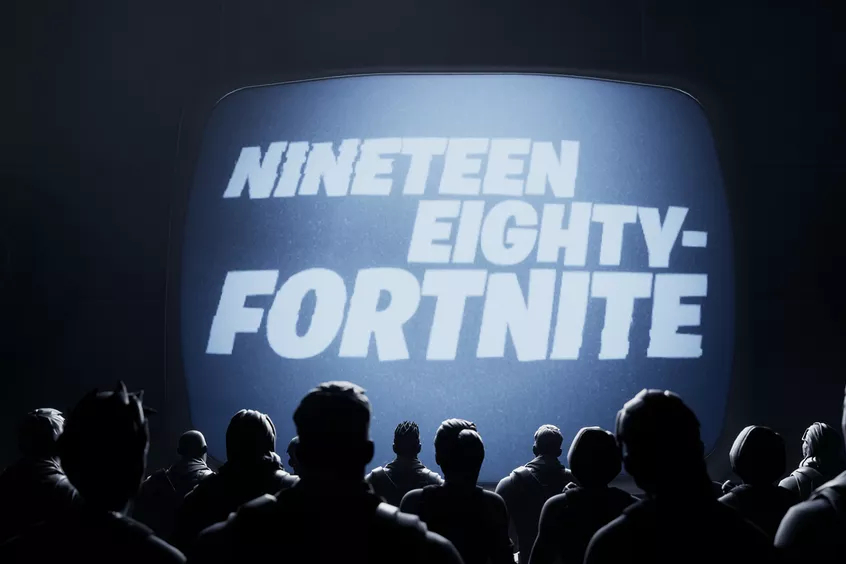
Epic Games is known for its over-the-top and bombastic video games such as the smash hit, Fortnite. It turns out Epic Games’ approach to legal disputes is just as bombastic as its approach to game development. On August 13, 2020, Epic filed a lawsuit against Apple, alleging antitrust violations.1 Instead of merely filing a lawsuit and a press release, Epic has turned this legal challenge into a media blitz with a parody of Apple’s famous 1984 ad2 and even an in–game event.3 Epic’s marketing campaign has been successful, prompting CNN to wonder if Fortnite has killed the App Store as we know it.4 Is this lawsuit as epic as commentators claim?
Fortnite, iOS, and a Fistful of V-Bucks
As Epic Games describes it in their complaint, Fortnite is “a colorful, virtual world where [players] meet, play, talk, compete, dance, and even attend concerts and other cultural events.5 Epic might be burying the lede with this description. The main draw of Fortnite is its “Battle Royale” mode where players strive to be the last person standing by killing their rivals. Fortnite Battle Royale combines building mechanics similar to those in the uber-popular Minecraft with the battle royale mechanics from PlayerUnknown’s Battlegrounds. For those more interested in teamwork, “Save the World” mode lets players unite to survive a zombie apocalypse. Fortnite also offers a creative mode where players are free to be more creative and, if they so choose, less violent.
Fortnite’s popularity can perhaps be attributed to its free-to-play format. To play the top competitive multiplayer games of yesteryear, such as games in the Call of Duty franchise, gamers would have to plunk down $60 before they could fire their first shot. In Fortnite though, players can enjoy the game without ever spending a single penny. Players can download the game for free and enjoy all of its basic functionality.
Every few months players can buy a new “Battle Pass” using V-Bucks, Fortnite’s in game currency.6 Buying a Battle Pass grants you a variety of cosmetic bonuses, allowing you to change the look of your characters and weapons, and giving you new dances to mock your fallen opponents.7 Leveling up your Battle Pass offers you even more rewards, incentivizing players to keep playing.8 Gamers can also access a shop where they can buy specific costumes and items for a set price.9
V-Bucks are the cause of the tension between Apple and Epic. V-Bucks can be earned by playing the game and completing certain challenges but can also be purchased with real-world currency. When a player using an iOS device buys V-Bucks, they have to use Apple’s proprietary in-app payment system (hereafter IAP), which is required for all purchases of digital content for iOS apps.10 When an in-app purchase is made through Apple Pay, Apple takes 30% of the proceeds.11 If you buy 1,000 V-Bucks for $10, $7 will go to Epic Games, and $3 will go to Apple.
Epic Games contacted Apple requesting that they be allowed to use their own software and in-app payment service, which Apple declined.12 In response, Epic Games activated a “hotfix” in Fortnite.13 After the “hotfix” was activated, players who attempted to purchase 1,000 V-Bucks were given the option of paying Epic Games $7.99 directly or paying $9.99 through Apple Pay.14 After becoming aware of this, Apple delisted Fortnite from the App Store, offering the option to submit a new version without the option to circumvent Apple Pay.15
What is a Market?
To prove their case, Epic has to show that Apple has a monopoly and is abusing their monopoly power. The trickiest part of the case is determining exactly what market Apple is monopolizing.
The definition of monopoly power in the Ninth Circuit is given in Aya Healthcare Servs., Inc. v. AMN Healthcare, Inc. According to Aya, monopoly power exists when “the defendant owns a dominant share of a market,” and “there are significant barriers to entry and . . . existing competitors lack the capacity to increase their output.”.16 If, as Epic claims, the market in question is the App Store, then Apple would certainly have a monopoly. Apple, in response, argues that a market limited to ‘iOS apps’ has no basis in reality.”17
In the 1957 Supreme Court case of United States v. E.I. du Pont de Nemours & Co., the Court held that the defendant did not have a monopoly over the cellophane industry, despite controlling 75% of the cellophane market.18 The Court argued that other products similar in purpose to cellophane must be considered part of the market, and when considering the entire market of soft plastic wrappings, the defendant did not have a monopoly.19 Similarly, Apple argues that Fortnite is available on multiple platforms, such as iOS, Nintendo Switch, PlayStation 4, Xbox One, PC, and MacOS.20 If, as Apple argues, the versions of Fortnite are interchangeable, Epic would have a hard time arguing Apple has a monopoly.
In regards to the iOS in the App Payment market, Apple makes a more pragmatic argument: “If developers can avoid the digital checkout, it is the same as if a customer leaves an Apple retail store without paying for shoplifted products: Apple does not get paid.”21 Apple argues that app developers benefit from the digital storefront Apple has developed, and Apple is entitled to compensation from those enjoying those benefits.22 As such, even if Apple does have a monopoly, its use of its own in-app payment method serves a legitimate purpose and is not an abuse of monopoly power.23 While this argument has a certain logic to it, Apple ignores the enormous differences between a physical store and its App Store, which is not limited by the same geographical and logistical constraints.24
Is This the End?
Is this, as CNN portends, the end of the App Store as we know it? In the view of antitrust lawyers Tom Brown, Bo Pearl, and Steven Marenberg, probably not. According to the three attorneys “Epic faces an uphill legal battle.”25 For the reasons noted above, the three are skeptical that Epic has identified a relevant economic market.26 They note that similar lawsuits have not been successful. At a minimum, Epic Games would have to show that the App Store represents a relevant product market. Even then, they bear the burden of showing that by taking 30% of the proceeds from in-app purchases, Apple is abusing their monopoly power. This may also be challenging, as 30% tends to be the industry standard for both physical and digital storefronts.27
With that being said, Epic’s lawsuit is just battle in a much larger war. Other app developers have claimed that Apple employs practices designed specifically to disadvantage certain apps in order to drive competitors towards directly competing apps developed by Apple.28 Apple is also one of the subjects of a House Judiciary Committee report, which concludes that Apple does indeed hold monopoly power.29 The European Union has opened an investigation as to whether Apple is in breach of EU competition laws.30
So, while Epic’s lawsuit on its own likely will not bring down the App Store, it is part of a larger movement. Even if Epic itself is unlikely to prevail, they are pouring gas on the fire and encouraging customers and developers to speak out against Apple with their voices, their wallets, and their lawyers.
Justin Weinblatt is a Second Year Law Student at the Benjamin N. Cardozo School of Law, and a staff Editor at the Cardozo Arts & Entertainment Law Journal. Justin is interested in tax law. In his spare time, Justin is an avid gamer and an amateur stand-up comedian.
- Complaint for Injunctive Relief, Epic Games, Inc., v. Apple Inc., No. 4:20-CV-05640-YGR (N.D. Cal. Aug. 13, 2020).
- Igor Bonifacic, Epic’s Parody of Apple’s 1984 Ad Ends with #FreeFortnite, Engadget (Aug. 13, 2020), https://www.engadget.com/nineteen-eighty-fortnite-a-205310026.html?guccounter=1&guce_referrer=aHR0cHM6Ly93d3cuZ29vZ2xlLmNvbS8&guce_referrer_sig=AQAAACrUwQxRaQ_UHoo7C6sVKZ5DCyB-gFUGEQ4wI3cKGjlgxQV6LVwQHr0zjGeWBRFJMzWmNmBYWDJ4JLAwz6t2PVHSq7B55BhVEnXlRfO4m1XWYuqQ-NYnDMMM1dOFHyF-WjyunyM2WaHViFlcYrmedKKSsui3aNINrLImjbaudNsI.
- Jay Peters, Epic Used Its Playbook for Fortnite Events Against Apple and Google, The Verge, (Aug. 18, 2020, 2:48 PM), https://www.theverge.com/2020/8/18/21373875/epic-games-fortnite-apple-google-ban-playbook-in-game-events
- Shannon Liao, Did Fortnite Just Kill the App Store as We Know It?, CNN (Aug. 17, 2020, 1:06 PM), https://www.cnn.com/2020/08/15/tech/fortnite-apple-google-lawsuit/index.html,
- Complaint at 5, supra note 1.
- Connor Sheridan, Fortnite Battle Royale Does Microtransactions Perfectly…with One Big Exception, GamesRadar (Mar. 2, 2018), https://www.gamesradar.com/fortnite-battle-royale-does-microtransactions-perfectly-with-one-big-exception/.
- Id.
- Id.
- Id.
- Complaint at 27, supra note 1.
- Id.
- Id.
- Defendant’s Opposition to Motion for TRO at 2, Epic Games, Inc. v. Apple Inc., No. 4:20-CV-05640-YGR (N.D. Cal. Aug. 21, 2020).
- Complaint at 7, supra note 1.
- Defendant’s Opposition to Motion for TRO at 2, supra note 13.
- Aya Healthcare Servs., Inc. v. AMN Healthcare, Inc., 2018 U.S. Dist. LEXIS 102582, at *59–60 (S.D. Cal. June 19, 2018) (quoting Rebel Oil Co. v. Atl. Richfield Co., 51 F.3d 1421, 1437 (9th Cir. 1995).
- Defendant’s Opposition to Motion for TRO, supra note 13 at 17.
- United States v. E.I. du Pont de Nemours & Co., 351 U.S. 377, 76 S. Ct. 994, 100 L. Ed. 1264 (1956).
- United States v. E.I. du Pont de Nemours & Co., 351 U.S. 377, 76 S. Ct. 994, 100 L. Ed. 1264 (1956).
- Defendant’s Opposition to Motion for TRO, supra note 13, at 16.
- Id. at 4.
- Id.
- Id.
- Note that one component of this litigation revolved around a request for a temporary restraining order. The decision regarding the restraining order turned on whether or not the injuries resulting from Fortnite being delisted were self-inflicted. As this decision did not relate to the underlying antitrust claims, this issue was not discussed here. See Order Granting in Part and Denying in Part Motion for Preliminary Injunction, Epic Games, Inc. v. Apple Inc., No. 4:20-CV-05640-YGR, at *12 (N.D. Cal. Oct. 9, 2020).
- Tom Brown, Bo Pearl & Steven Marenberg, Breaking Down the Epic v. Apple Fight, Paul Hastings (Sept. 25, 2020), https://www.paulhastings.com/publications-items/details/?id=20001370-2334-6428-811c-ff00004cbded.
- Id.
- Tom Marks, Report: Steam’s 30% Cut Is Actually the Industry Standard, IGN (Oct. 7, 2019 1:45 PM), https://www.ign.com/articles/2019/10/07/report-steams-30-cut-is-actually-the-industry-standard.
- See A Timeline: How We Got Here, Spotify, https://timetoplayfair.com/timeline/ (last visited Oct. 19, 2020) (arguing that Apple has abused its power to drive consumers away from popular music app Spotify to drive them towards their own Apple Music app).
- See Press Release, Jerold Nadler, Chair. of H. Comm. on the Judiciary, Judiciary Antitrust Subcommittee Investigation Reveals Digital Economy Highly Concentrated, Impacted by Monopoly Power (Oct. 6, 2020), https://judiciary.house.gov/news/documentsingle.aspx?DocumentID=3429.
- See Press Release, Eur. Comm’n, Antitrust: Commission Opens Investigations into Apple’s App Store Rules (June 16, 2020), https://ec.europa.eu/commission/presscorner/detail/en/ip_20_1073.



